|
|
|
Sort Order |
|
|
|
Items / Page
|
|
|
|
|
|
|
| Srl | Item |
| 1 |
ID:
108776
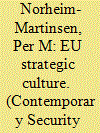

|
|
|
|
|
| Publication |
2011.
|
| Summary/Abstract |
After being debated in academic circles for years, the idea of a common European Union strategic culture was elevated to a policy objective in the 2003 European Security Strategy. However, whether the European Union has a strategic culture or not is still up for debate. By drawing on developments in strategic culture theory, this article demonstrates that the idea of strategic culture is not only compatible with the European Union, but may be a particularly useful conceptual tool for studying actors for which cultural factors can make up for the lack of more material ones, such as borders, language, political structure, national history, and so on. Offering a fresh perspective on the European Security Strategy, it shows that a specific strategic culture has evolved in the EU, in which consensus on a comprehensive approach to security as a unique European asset has become a focal point for the fledgling European Security and Defense Policy (ESDP). However, the article concludes that this does not provide for a robust strategic culture. The repeated emphasis on the EU's unique potentials as a comprehensive security actor will also invite criticism if the EU fails to mount operations that reflect its own success formula.
|
|
|
|
|
|
|
|
|
|
|
|
|
|
|
|
| 2 |
ID:
108774
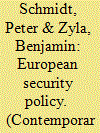

|
|
|
|
|
| Publication |
2011.
|
| Summary/Abstract |
With the Lisbon Treaty in place and the European Union increasingly involved in crisis management and stabilization in places near and far, this Special Issue examines whether European security behaviour is evidence of an actual strategic culture. Contrary to prevailing scholarship on the subject, this volume demonstrates that strategic culture, as an analytical tool and force on European strategic goals and conduct, is far from conclusive. Ostensibly, the development of a security culture was a major lever by which the European Union's principal planning document, the European Security Strategy of 2003, tried to guide the European Union's role in international security. This volume revisits the trajectory of the concept of strategic culture and examines its application in a variety of circumstances, especially operations in Africa and the Balkans, including joint operations with NATO and the United Nations. The contributors to this Special Issue find that strategic culture is a useful tool to understand EU's operations, not in the sense of a 'cause', but as a uniquely European normative framework of preferences and constraints. Classical notions of strategic culture must be adapted to highlight the specific evolution of Europe's strategic culture. Though at variance over the extent to which security and defense missions have promoted a shared strategic culture in Europe, the authors in this Special Issue reveal a growing sense that a strategic culture is critical for European ambition as a global actor. Should Europe fail to nurture a shared strategic culture, its ambitions and the normative framework that underpins it will unravel.
|
|
|
|
|
|
|
|
|
|
|
|
|
|
|
|
| 3 |
ID:
108779


|
|
|
|
|
| Publication |
2011.
|
| Summary/Abstract |
The following exploratory case study analyses European Union's military involvement in the Democratic Republic of Congo in the framework of two operations: Artemis (2003) and EUFOR (2006). The European Union in this context is not regarded as a 'single actor' but as part of a system, including the member states and the United Nations. In order to bridge the gap between strategic culture and behaviour, it is proposed to broaden the scope of the strategic culture approach by taking specific interests and 'games' played by the actors across these levels into consideration. The analysis also suggests that two background features of the multi-level 'game' as part of the European Union's strategic culture should be especially recognized: the 'barrack yard syndrome' as a principle of behaviour influencing the question who of participates in the operation, and 'multilateral Caesarism' as a feature of the 'multilevel game' which limits parliamentarian control of decisions and may also have a major impact on decisions to launch a military operation in the framework of the EU.
|
|
|
|
|
|
|
|
|
|
|
|
|
|
|
|
| 4 |
ID:
108780


|
|
|
|
|
| Publication |
2011.
|
| Summary/Abstract |
The Common Security and Defence Policy (CSDP) is in crisis. The concept of strategic culture is controversial, even more so at the European level. Yet as a historical context and as a grouping of shared beliefs and practices, it helps us to better understand how and why the promises of Saint-Malo were not met. A specific set of European political and security beliefs that should not be confused with a strategic culture were developed at the European level. The EU's misunderstanding of human security, combined with a widespread risk aversion, has transformed CSDP missions into political exercises, more focused on Europe's own image, posture and legitimacy than on the strategic requirements necessary to their success. The EUFOR Chad mission, the longest and most complex CSDP mission so far, was a good illustration of this problem. Moreover, this operation played a significant role in the French disillusion and estrangement from CSDP itself. The credibility and legitimacy of the Union in security and defence are now in doubt.
|
|
|
|
|
|
|
|
|
|
|
|
|
|
|
|
| 5 |
ID:
108778
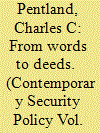

|
|
|
|
|
| Publication |
2011.
|
| Summary/Abstract |
Evidence that the European Union has acquired a distinctive strategic culture must be sought in the realms both of ideas and of action. Elements of a declaratory European Union strategic culture are to be found in the 2003 European Security Strategy and the subsequent reflections of officials and academics. A supplementary but perhaps more reliable guide to its central features may lie in how the European Union has conducted itself in the 24 European Security and Defence Policy missions, both military and civilian, that it has created since 2003. Overviews of these missions reveal some consistent themes and patterns of behaviour roughly congruent with the discourse of EU strategic culture. A closer analysis of the two Balkan military operations - Concordia in the Former Yugoslav Republic of Macedonia and Althea in Bosnia-Herzegovina - gives a richer and more nuanced picture of the relationship between words and deeds. The aim in studying strategic culture should be not to reveal causality as much as to explore consistency between ideas and action.
|
|
|
|
|
|
|
|
|
|
|
|
|
|
|
|
| 6 |
ID:
108781
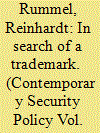

|
|
|
|
|
| Publication |
2011.
|
| Summary/Abstract |
Is the European Union about to develop a strategic culture? Analysis of past and present civilian missions under the European Security and Defence Policy in Africa and the assessment of the corresponding institutional setup in Brussels, including the Lisbon Treaty, does not deliver evidence for such a geopolitical quality. Most of the European Union member states continue to be preoccupied with the practical puzzle of the EU's internal build-up. At best the former colonial powers, especially Paris and London, seem to have an idea of a more far-reaching role of the EU on the African continent (see Libya). In the security field the European Union remains a collection of states with no common defence and not much collective, let alone unified, political will. It also lacks the ability to mount the resources for its declared international ambitions. Without these prerequisites for any development of a strategic culture Brussels is condemned to stay at the margin of an increasingly competitive multipolar world and to simply hope for some influence in individual cases of intervention.
|
|
|
|
|
|
|
|
|
|
|
|
|
|
|
|
| 7 |
ID:
108775
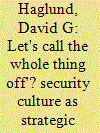

|
|
|
|
|
| Publication |
2011.
|
| Summary/Abstract |
Scholars interested in contemporary security and defence policy, in Europe as elsewhere, often seek refuge in conceptual havens, and the articles in this special issue are no exceptions. One of those sheltering spots has been dubbed security culture, while another fashionable resting place carries the label, 'strategic culture'. This article argues that attempts to draw a distinction between the two categories are superfluous, not to say meaningless, and that insofar as what we should call our concept, it really is a case of Tweedledum and Tweedledee. More important is the task of attempting to abstract policy significance from the complexity and definitional vagueness of the more 'senior' of the two concepts, namely strategic culture. This complexity and vagueness to the contrary notwithstanding, this article claims that strategic culture can be of some analytical use in highlighting the ways in which both context and character have played, and continue to play, a part in shaping states' orientation toward security and defence policy.
|
|
|
|
|
|
|
|
|
|
|
|
|
|
|
|
| 8 |
ID:
108784


|
|
|
|
|
| Publication |
2011.
|
| Summary/Abstract |
This paper discusses the inter-organizational relationship of the two leading security organizations in Europe: the European Union and the North Atlantic Treaty Organization. Rather than discussing the two organizations' material overlaps, the paper discusses their quest for organizational identity and role in the domain of foreign and defence policy, as well as the ideational structures that affect both institutions' social behaviour and their behaviour toward each other. It aims first to tease out how structures of meaning in the form of norms, values, and beliefs have affected the two organizations' behaviour toward each other; and second to introduce explanatory arguments about their subcultural relationship that can help explain their attitudinal divergences. The article makes two arguments: First, there is a significant normative overlap between the two institutions, especially with regards to future challenges and threats and the role of third parties and international organizations. Second, I introduce a preliminary argument by holding that the best way to make sense of the ideational divergences between the two organizations is to conceptualize NATO's strategic culture as a subculture of the European Union's strategic culture.
|
|
|
|
|
|
|
|
|
|
|
|
|
|
|
|
| 9 |
ID:
108782
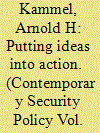

|
|
|
|
|
| Publication |
2011.
|
| Summary/Abstract |
Since the early days of the Common Foreign and Security Policy and the European Security and Defence Policy, the EU has always paid special attention to developments in the Western Balkans and therefore declared them a strategic priority for European external action. Thus, it is not surprising that the first missions in the framework of ESDP were deployed to this region. Considering the deployment of civilian crisis management missions to the Western Balkans a first step in the shaping of a strategic culture and based on the assumption that the European Union clearly possesses the prerequisites to form such a strategic culture, the following chapter will analyse the development of civilian crisis management and chronologically describe and evaluate the four civilian missions carried out in the Western Balkans. The conclusion is that despite the fact that ESDP is still a work in progress, the engagement in civilian crisis management missions already provides a marker for the existence of an emerging European strategic culture in the process of formation.
|
|
|
|
|
|
|
|
|
|
|
|
|
|
|
|
| 10 |
ID:
108783


|
|
|
|
|
| Publication |
2011.
|
| Summary/Abstract |
This analysis aims to identify the relative significance of strategic culture for interorganizational cooperation problems, here of the European Union and United Nations in the realm of conflict and crisis management. First, the respective strategic cultures are identified and compared in order to formulate expectations (hypotheses) for co-operation problems. Second, the practice of inter-organizational co-operation is investigated by using illustrative examples from three European Union operations conducted in collaboration with the United Nations: Operation Artemis, DR Congo 2003, EU EUFOR DR Congo 2006, and EUFOR Chad 2008. Different types of material and institutional factors hampering cooperation are identified. Third, empirical findings are interpreted and evaluated in terms of evidence for strategic culture as a causal factor influencing co-operation. This analysis suggests that in this case strategic culture is apparently a comparatively marginal factor hampering interorganizational co-operation.
|
|
|
|
|
|
|
|
|
|
|
|
|
|
|
|
| 11 |
ID:
108777


|
|
|
|
|
|
|
|